Today sees the anniversary of a murder that, although perhaps not on a par with the Jack the Ripper crimes, most certainly did shock the people of late 19th century London.
The victim of this particular atrocity was the dashing actor William Terriss, and his murder took place outside the Stage Door of London’s Adelphi Theatre, on Maiden Lane, close to Covent Garden Market. Indeed, strollers along Maiden Lane today can still view a green plaque on the rear wall of the theatre that commemorates the fact that “William Terriss, 1847 – 1897, Hero of the Adelphi Melodramas, met his untimely end outside this theatre 16 Dec 1897.”

A VICTORIAN MATINEE IDOL
William Terriss was the matinee idol of the late Victorian era. With his charisma, good looks and suaveness of manner he was, quite simply, a STAR. He was a hugely popular actor – and, I think I can safely say, he was nothing less than the Johnny Depp, Tom Cruise, Daniel Craig or Philip Hutchinson of his day – and the crowds flocked to watch him perform in the melodramas for which the Strand’s Adelphi Theatre was renowned.
At the time of his death Terriss was wowing audiences in his role as Captain Thorne in the play “Secret Service.”
He spent the afternoon of Thursday 16th December 1897 playing Whist at his West End club.
At around 4pm he returned to his residence and spent some time in the company of one of his oldest friends, Mr Henry Graves.
ARRIVES AT THE THEATRE
At around 7pm that evening they took a cab to the Adelphi Theatre and, having been dropped off at the junction of Bedford Street and Maiden Lane, they proceeded to walk along Maiden Lane to the private stage door of the Adelphi Theatre that was only used by Terriss and two of the other principals of the company.
This door adjoined the Royal Stage Door, which can still be seen in Maiden Lane and which still has the royal crest emblazoned above it.
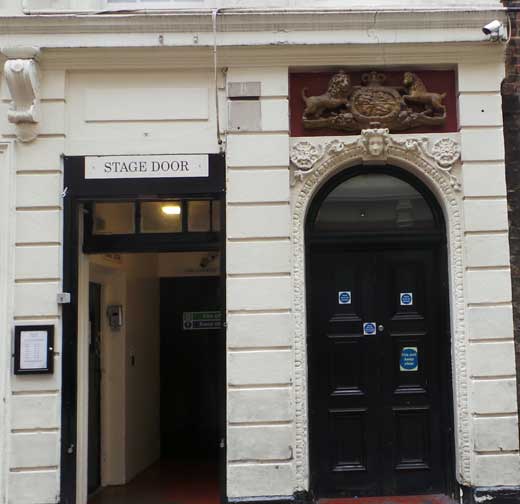
As they approached the door, Terriss said to Graves, “Wait a minute Harry till I get my keys,” whereupon he proceeded to take his keys from his pocket and then, stooping slightly, he put his key in the door.
A SUDDEN ATTACK
As he did so, according to Graves’s later testimony, “…somebody rushed from across the road and struck him two blows most rapidly on the back…”
So quickly did events unfold that Graves, and indeed several passers-by, later said that they, at first, mistook the action as being nothing more sinister than a friendly pat on the back, although Tate did comment that it had occurred to him “how exceedingly rough the act of friendship was.”
Terriss himself appears to have thought likewise and he turned to face his attacker.
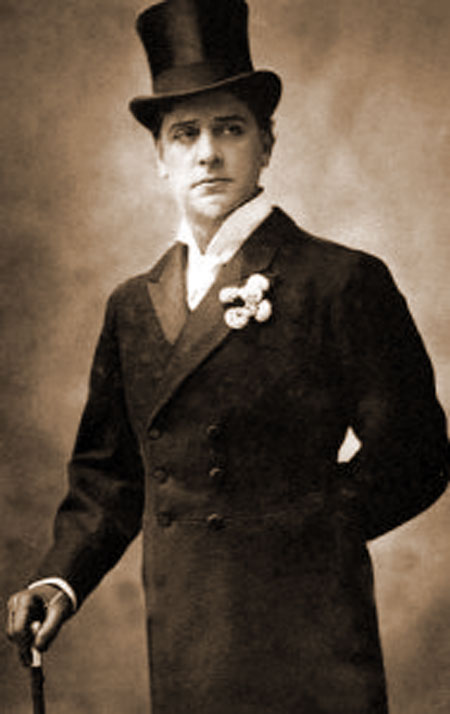
I AM STABBED ARREST HIM
As he did so, the raised his arm a third time and plunged a large knife deep into the actor’s chest.
At this point Terriss, realising the seriousness of the situation, cried out, “My God, I am stabbed; arrest him,” whereupon several of the theatre scene-shifters came to his aid and, according to one newspaper report, “formed all too late a bodyguard.”
They carried him into the stage door passage and propped him up on pillows and placed ice upon his chest.
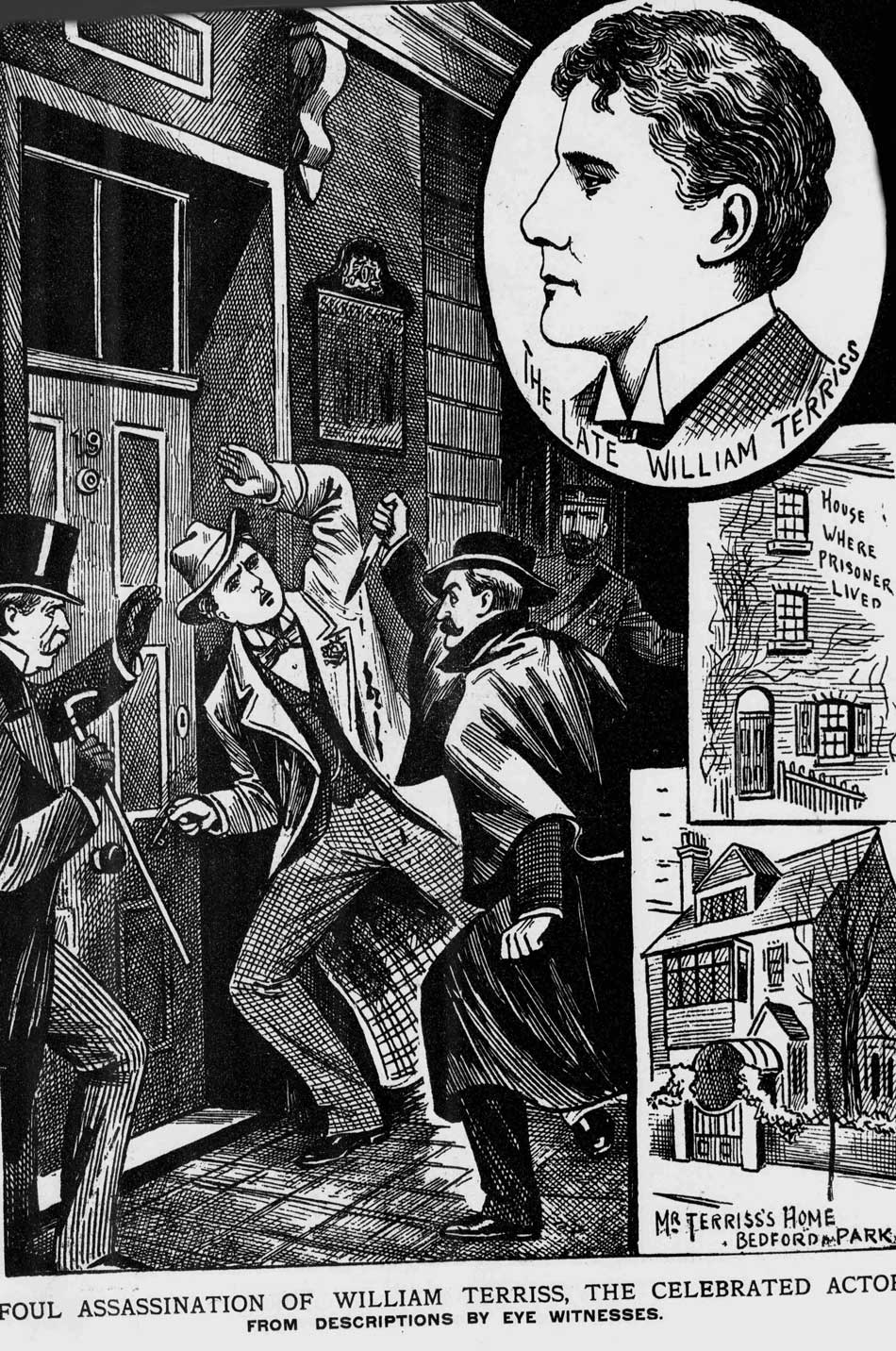
BEYOND MEDICAL HELP
Doctors Walter H. Morgan and W. Curling Hayward, of the nearby Charing Cross hospital, were quickly summoned to the scene and they arrived at 7.30pm. They found the stricken actor lying in the stage door passage, where the stage hands had placed him. On examining the patient, the doctors discovered the three stab wounds, one of which – situated on the left of the chest, directly above the heart – according to newspaper reports “would have been sufficient to cause death.”
The doctors instructed that he be carried to a sofa in his dressing room where, so witnesses reported, he made one or two faint attempts to speak, although he did not appear to be conscious.
As it transpired, he was beyond medical help and at, according to Dr. Hayward’s later testimony “he was sinking very fast—his death took place at two or three minutes to eight—during that time he was semi-conscious.”
THE AUDIENCE DISMISSED
Unaware of the drama unfolding backstage the audience were, at that very moment, filing into the theatre to take their seats for that night’s performance. Such was Terriss’s popularity that the house was full and the management was left with the unenviable task of informing the eager audience that the performance was to be cancelled that night.
One can only imagine the nervousness with which the theatre’s official faced the house, almost all of whom had no knowledge of the tragedy that had occurred, to inform them that “Mr Terriss had met with such a serious accident that he would be totally unable to appear that night.”
The audience were given the option of a full refund all the opportunity to exchange their tickets for another night.
As he left the stage cries of “understudy” sounded out. But, gradually, these diminished and the disappointed audience began filing out into the Strand.
THE ASSAILANT APPREHENDED
In the street outside the theatre Henry Graves had kept a close eye on the assassin and, amidst the general pandemonium and cries of “murder” and “police”, he, according to his later testimony, followed the man and never lost sight of him for a moment.”
Giving evidence in court he stated that:-
“…a constable came up and I said “I charge this man with stabbing Mr. Terriss” – I cannot say exactly how far he had got from the door of the theatre when the constable came up, it was some little distance – I and the constable went with the prisoner to the police-station; the prisoner walked very quiety, he was in the middle and the constable and I were on either side of him – he said nothing when I gave him in charge – on the way to the station I said to the prisoner “What could have induced you to do such a cruel deed” – he said “Mr. Terriss would not allow me to have any employment, and I did it,” either “in revenge,” or “by way of revenge,” I am not quite certain which – when the prisoner was charged at the station I returned to the theatre, and found Mr. Terriss lying at the foot of the stairs, he was dying then, and he died in my presence shortly afterwards…”
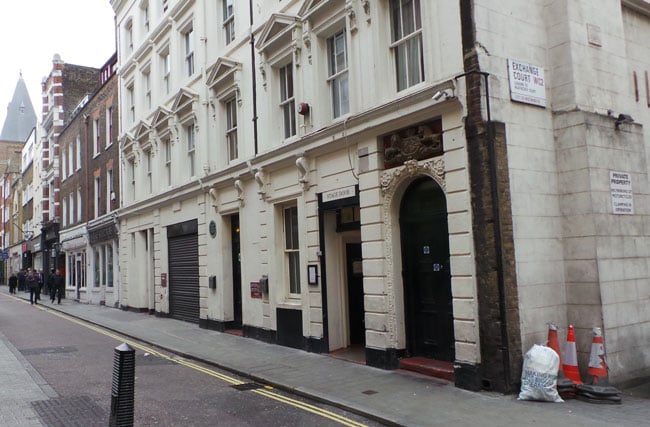
CONSTABLE BRAGG’S TESTIMONY
The constable in question was PC John Bragg who later stated how:-
“On December 16th, about 7.30 in the evening, I heard cries of murder and police in Maiden Lane – I went there and found Mr. Graves and the prisoner about 100 yards from the private door of the theatre, towards Southampton street – Mr. Graves said, “I give this man into custody for stabbing Mr. Terriss” – I took hold of the prisoner – he said, “What is the matter” – I said, “You know what is the matter” – on the way to the station, Mr. Graves said, “What made you do such a dreadful, bloody thing as that” – he said, “In revenge, he blackmailed me for 10 years” – he used the word “black-mailing,” two or three times – on the road to the station he also said, “I have given him due warning plenty of times” – he also said, “I should either have to die in the street, or have my revenge” – Inspector Wood took the charge at the station.”
THE KNIFE IS PRODUCED
Inspector George Wood was on duty at Bow Street Police Station when the door opened and the accused was brought in.
The first to speak was Henry Graves, who announced,”this man has stabbed Mr. William Terriss at Maiden Lane, as he was about to enter the stage door of the Adelphi Theatre.”
“Where is the knife?” Asked the Inspector, at which point the prisoner threw back the Inverness Cape that he was wearing and produced a large, bloodstained knife from his coat pocket.
Handing it to the Inspector, he informed him, with no hint of remorse, “that is what I stabbed him with, he had due warning, and if he is dead he knows what he had to expect from me; he prevented me from getting assistance from the Actor’s Benevolent Fund to-day, and I have stopped him.
RICHARD ARCHER PRINCE
The accused then gave his name as Richard Archer Prince, of 16 Eaton Court, Eaton Lane, Buckingham Palace Road.
It later transpired that the accused was, not only known to William Terriss, but that he was also a fellow actor who had appeared in several plays alongside him.
However, it was more than evident that Prince was mentally unstable and, as a consequence of his bad tempered outbursts and erratic behaviour, he had found himself without roles and, as a result, facing extreme financial hardship. This exacerbated his mental instability and, by late 1897, he was a ticking time bomb.
HE BLAMED TERRISS
Evidently, he had come to blame Terriss for his predicament, despite the fact that Terriss had shown him considerable kindness, and had even recommend him for assistance from the Actor’s Benevolent Fund, based in Adam Street, just off Strand. But funds from even this source had not been recently forthcoming and his paranoia regarding William Terriss was growing.
A PREMEDITATED MURDER
The crime, it seems, had been premeditated and there were several warning signs that Terriss was in danger.
Henry Spratt, the stage doorkeeper at the Adelphi Theatre, for example, testified that, at the end of October or the beginning of November, Prince had come to the stage-door and asked him to convey a letter to Mr. Terriss, and get an answer. “I got an answer after about half-an-hour – I conveyed that answer to the prisoner – I said, “The answer to the letter is All right”
However, according to his later testimony, “after that I noticed him about the stage-door on several occasions – he was round the stage-door about six times altogether – he was there for about half an hour – Mr. Terriss was not in the habit of using the stage-door himself – he went in at a private door in Maiden Lane, of which he had a key – I remember on Wednesday, December 15th, the prisoner coming and speaking to me – it was about 6.50, or it might have been later. He said, “Mr. Terriss comes up this way, doesn’t he,” meaning the stage-door – I said, “Yes” – that was the last I saw of him.
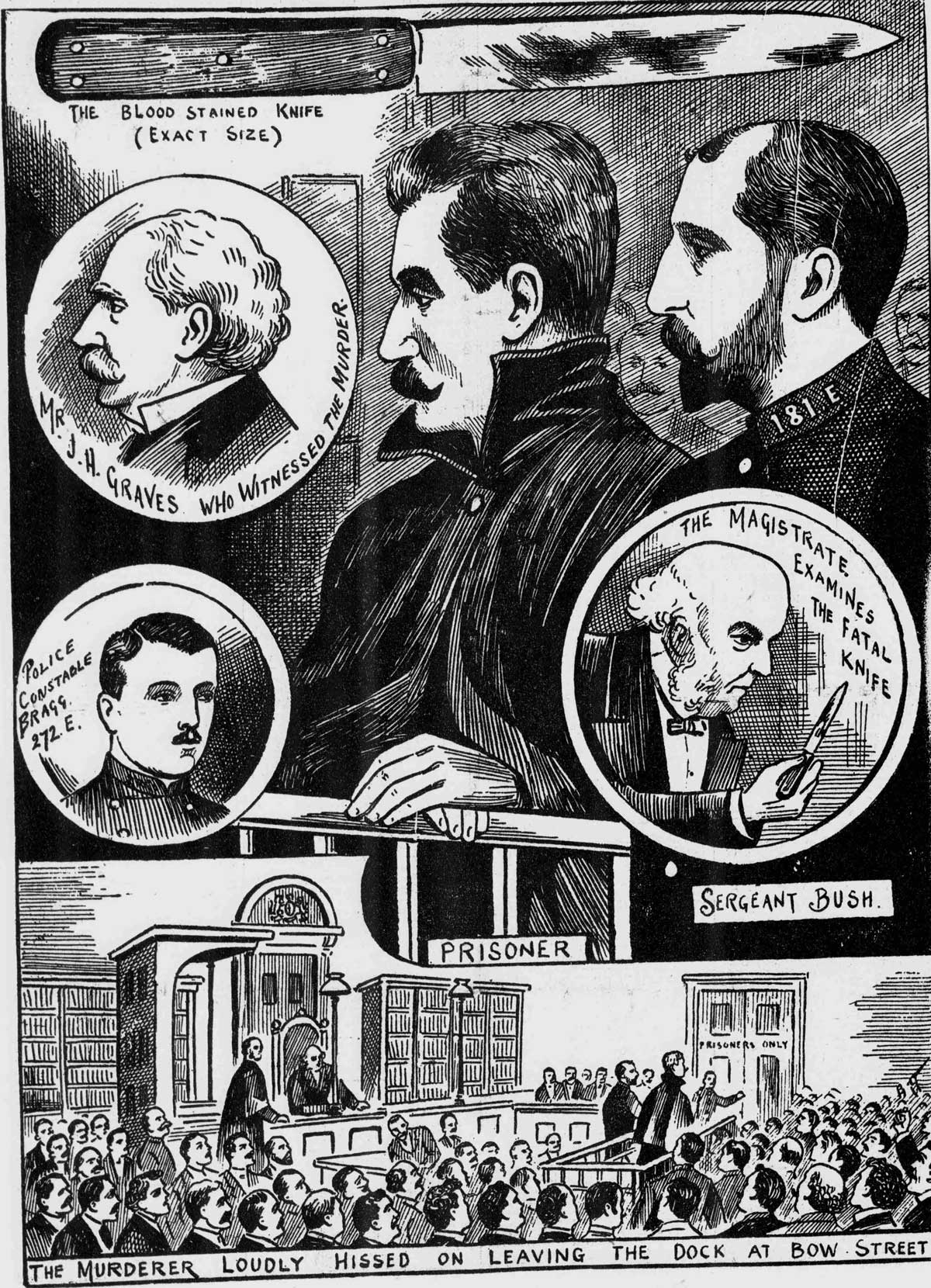
HE WAS OBVIOUSLY INSANE
At Prince’s Old Bailey trial, witnesses and doctors alike testified to his unstable state of mind. Henry Charles Bastian, Physician to the Hospital For Paralysis and Epilepsy, visited Prince in Holloway Prison and told his trial that:-
“I connect the act of killing Mr. Terriss with the delusions – I think the act he did was to a certain extent the outcome of the delusions themselves; he believed he was persecuted by Mr. Terriss for eight or ten years, and undoubtedly there was a connection between the act and the delusions – I do not think he was capable of exercising self-control at the time; taking the state of his mind as it had existed for some years, and then taking the privations and troubles he had had, I have no doubt he had no proper control.”
Under cross examination Dr Bastiann went into detail about Prince’s lack of remorse regarding the murder:-
“…He spoke with what I may call a most off-hand manner, and an air of levity about the act; them was no sign whatever of remorse for the act he had committed; indeed, he seemed to think it was an act of justice that Mr. Terriss should have been killed, and, as far as I could make out, that act of justice was brought about in some way through an intervention of the Almighty, and I think that notion I gathered then is really borne out by his demeanour and actions in Court to-day; he does not seem to be overladen with any feeling of remorse…”
GUILTY OF THE MURDER OF WILLIAM TERRISS
In giving their verdict the jury found Prince guilty of the murder, adding that they found the prisoner knew what he was doing and to whom he was doing it; but that upon the medical evidence he was insane so as not to be responsible for his actions according to law at the time he committed the act.
SENT TO BROADMOOR
He was duly sentenced to be, “detained until Her Majesty’s pleasure be known,” and was sent to Broadmoor Criminal Lunatic Asylum, where he became involved in entertainment for the inmates and conducted the prison orchestra until his death in 1936.
